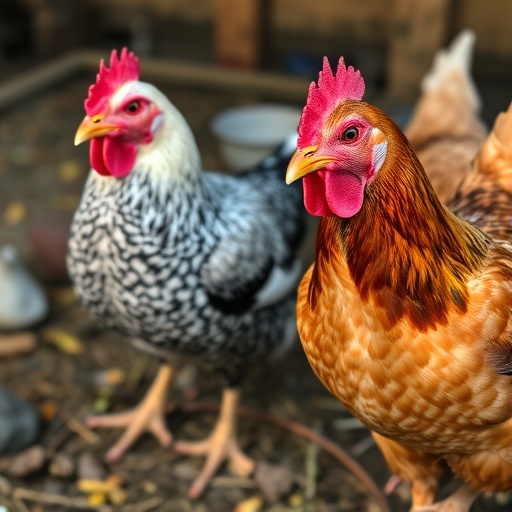In a groundbreaking study published by Berihulay, Luo, Lin, and their team, the intricate immune responses of chickens infected with Newcastle Disease Virus (NDV) were unveiled through advanced RNA sequencing technology. Newcastle disease, a highly infectious viral illness in birds, poses significant risks to poultry industries worldwide. Understanding the genotype-specific immune responses offers promising insights into developing more effective vaccines and therapeutic strategies to counteract this pervasive pathogen.
The research meticulously examined the transcriptomic profiles of avian spleen tissues, illustrating how distinct NDV genotypes influenced the immune response at a molecular level. By focusing on RNA sequencing, the authors captured dynamic gene expression changes during viral infection, allowing a targeted analysis of immune pathways that are critical during NDV exposure. This high-throughput approach not only provides a wealth of information but also enables researchers to map out the complex networks of immune modulation in avian species.
A prominent aspect of the study was the identification of immune-related genes showing significant differential expression across different genotypes of NDV. Within the spleen, which plays a pivotal role in immune function, variations in gene expression patterns were apparent, suggesting that the host’s immune response could be finely tuned depending on the specific strain of NDV involved. The team discovered notable upregulation of pro-inflammatory cytokines, essential for activating immune pathways and orchestrating defenses against viral invaders.
Additionally, the study delved into the roles of specific immune cells activated during NDV infection. The presence of various immune cells, including macrophages and T cells, was quantified to understand their contribution to the response. These immune cells exhibit distinct activation states that correlate with the severity of viral propagation and overall pathogen clearance. By employing RNA sequencing, the researchers were able to specify how these cell populations interact with the virus, illuminating pathways that may be exploited for vaccine development or therapeutic intervention.
Moreover, the research highlighted the activation of signaling pathways crucial for host defense mechanisms, such as the NF-κB and IFN pathways. These pathways are pivotal in regulating the expression of genes involved in inflammatory responses, cell survival, and the production of antiviral factors that can inhibit viral replication. The genotype-specific responses observed indicate that certain strains of NDV might exploit specific pathways more efficiently than others, thus evading the host’s immune defenses more effectively.
The implications of these findings are profound, particularly for poultry health management and disease prevention strategies in the agricultural sector. By dissecting the immune responses associated with particular NDV strains, veterinarians and researchers can improve vaccination protocols by tailoring them to target the most virulent strains. The insights gained from this study promise to aid in the design of robust vaccines that conform to the genetic landscape of circulating NDV strains in avian populations.
The researchers also emphasized the potential for utilizing gene expression data as a biomarker for assessing vaccine efficacy. By monitoring specific immune gene signatures post-vaccination, poultry managers could anticipate which vaccines confer the best protection against NDV, thereby optimizing immunization strategies and reducing the financial burden of outbreaks in poultry farms.
This study does not merely advance our understanding of NDV in chickens; it also sets the stage for broader applications of RNA sequencing in veterinary sciences. The methodologies developed can be applied to other avian pathogens, facilitating comprehensive studies on how these viruses shape host immune responses and how they might be controlled.
Further research is warranted to build upon these findings, particularly exploring how genetic diversity among chicken breeds influences immune responses to NDV. By integrating host genetics with pathogenic genomics, researchers could uncover novel resistance mechanisms that can be harnessed for breeding programs aimed at enhancing disease resistance in poultry.
As the world faces increasing challenges from infectious diseases, findings such as these remind us of the critical connection between animal health and food security. Strengthening our understanding of avian immune responses not only protects poultry populations but also has far-reaching implications for global food systems and public health.
The future of poultry health hinges on innovative research collaborations that bring together virologists, immunologists, and geneticists to further unravel the complexities of host-pathogen interactions. Ultimately, as these scientific inquiries deepen, they will pave the way for revolutionary approaches to managing infectious diseases in livestock.
In conclusion, the meticulously conducted research highlights the importance of genotype-specific immune responses in the context of NDV infection in chickens. By leveraging cutting-edge technology like RNA sequencing, the authors successfully illuminated previously unrecognized aspects of avian immunology, which can profoundly influence vaccine development and implementation strategies. The promise of these findings is not only to improve the health of poultry but also to elevate the standards of biosecurity and animal husbandry practices across the globe.
Subject of Research: Immune response in chickens infected with Newcastle Disease Virus (NDV).
Article Title: RNA sequencing analysis in chicken spleen infected with Newcastle disease virus reveals genotype-specific immune response.
Article References:
Berihulay, H., Luo, W., Lin, C. et al. RNA sequencing analysis in chicken spleen infected with Newcastle disease virus reveals genotype-specific immune response.
BMC Genomics 26, 1040 (2025). https://doi.org/10.1186/s12864-025-12078-8
Image Credits: AI Generated
DOI: https://doi.org/10.1186/s12864-025-12078-8
Keywords: Newcastle Disease Virus, RNA sequencing, immune response, poultry health, vaccine development, avian immunology.
Tags: avian immune modulationdifferential gene expression in NDVeffective vaccines for Newcastle diseasegenotype-specific immune responseshigh-throughput sequencing technologyimmune pathways in viral infectionimmune-related genes in poultryNewcastle Disease VirusNewcastle virus infection strategiespoultry industry researchRNA sequencing in chickenstranscriptomic profiles of avian spleen





